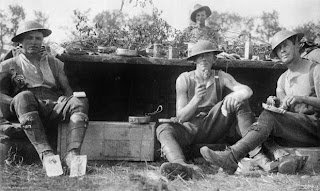This is an article from the Times dated 15th October 1917 about supplying the Army with the essentials of Jam, Cheese and Tea.
The amounts that are quoted are gigantic but these reports did keep the public informed what was required whilst they felt the ‘tight belt’ of rationing.
“FEEDING THE ARMY
THE SOLDIER’S JAM, CHEESE AND TEA.
Although at present housekeepers at home are finding some difficulty in getting supplies of such articles of food as bacon. Butter, margarine, sugar and tea, they will have no other feeling but one of pleasure that our soldiers at the front have never fared better that they are doing to-day.
From an authoritative source we learn that the soldier’s rations made up of about two dozen articles of food. Meat and bread are the chief items but the are supplemented by cheese, bacon, jam and many other things not leaving out rum, the value of which as an antidote to damp and cold, first learned by our experience in the Crimea, has been confirmed by three winters in France and Flanders.
In supplying the Armies with food whole industries have had to reorganized, business methods drastically revised, and the resources of the Empire mobilized in a remarkable manner. In the case of jam the manufactures, who are working in cooperation, are supplied by sugar by the Government and the Government also pays the actual cost of packing and delivery to and from the works and of the fruit. The fruit id bought by the manufactures jointly after mutual agreement as to the prices offered. The manufacturer realizes his profit on a fixed rate paid per 100lb.
TWO MILLION POUNDS OF JAM A WEEK.
Packing has been a difficulty. At first tins were used, but tin is scare and the jam is now packed in ‘papier mache’ containers. Nearly two million ponds of jam are sent to France every week and in April this year the contacts department of the War Office had ordered 260,000,000 lb. Twelve kinds are issued, among which strawberry now preponderates.
A daily cheese ration of 3 oz. had meant, up to the beginning of this year, the purchase of 167,000,000 and between one and two million pounds of chesses are being sent every week to the Army in France alone. With the exception of Dutch cheese, this is chiefly obtained from the Board of Trade’s purchases in Canada and New Zealand.
The supply of the soldier’s tea, of which the daily ration is just over half an ounce, is remarkable for the extent to which the army has been called on to take the business of the tea merchant into its own hands. Originally the Contracts branch bought tea blended and packed ready for issue to the troops. At a later stage the tea was brought where it lay, collected by Army transport and blended under a centralized system. This arrangement prevailed until recently, when a further rise in freights induced the War Office to import their own tea, placing orders directly with the growers in India and Ceylon and arranging for transport with the Admiralty. In this way the War Office has assumed the whole of the function of the tea-merchant. More than half a million pounds of tea are sent weekly to the Army in France. Before the War Office became its own tea merchant, single orders for a million pounds were no uncommon thing. The demand has grown with the growth of the Armies and the War Office has modified or changed its methods as developments required.”


